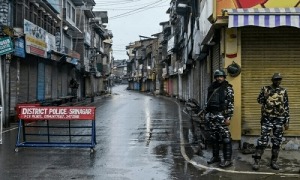Indian Supreme Court’s decision on the special status of occupied Kashmir by Pakistan It should be noted that the Supreme Court of India has rejected the petitions challenging the controversial decision of August 5, 2019 to abrogate Article 370 regarding the special constitutional status of Occupied Jammu and Kashmir and divide it into Union Territories. , and has ordered the Election Commission to hold elections in Occupied Jammu and Kashmir by September 2024. While giving a news conference in Islamabad, Pakistan’s Caretaker Foreign Minister Jalil Abbas Jilani said that India has not fulfilled its international obligations. Pakistan will continue to strongly support Kashmiris’ right to self-determination. Restoring statehood, holding state assembly elections or similar measures cannot serve as a substitute for granting the right of self-determination to the Kashmiri people, a decision that has not drawn the international community’s attention to the serious and systematic violation of human rights. can remove India’s unilateral and illegal move since August 5, 2019 is aimed at changing the demographic structure and specific landscape of Occupied Jammu and Kashmir. This flagrant violation of international law and relevant UN Security Council Resolutions, particularly Article 122 of 1957, is of grave concern to Pakistan as its ultimate goal is to turn Kashmiris into a powerless community in their own land. The caretaker foreign minister said that these measures should be withdrawn to create an atmosphere of peace and dialogue, Pakistan will continue its full political, diplomatic and moral support for the people of Jammu and Kashmir to achieve their right to self-determination.Today’s decision of the Indian Supreme Court has no status, the Kashmiri people have already rejected Indian unilateral actions, Indian actions are a violation of international laws, Indian actions are genocide of Kashmiris and an attempt to turn them into a minority. We will soon call a meeting of all stakeholders and decide the future course of action. Jammu and Kashmir is a global conflict. There are UN resolutions on Jammu and Kashmir. has no right. Will write letters to Security Council, OIC and European Parliament on this issue, Pakistan will raise this issue before all stakeholders, Pakistan has already put India’s unilateral actions before the world, UN All international forums including the United Nations, the European Union and the OIC are aware of India’s actions on August 5. The Kashmir problem has been on the agenda of the United Nations for a long time, and for its solution, the resolutions of the United Nations must be followed. Pakistan will consider every option on the decision of the Indian Supreme Court. The Indian Supreme Court also gave the decision of Babri Masjid biasedly and the decision is also of the same nature. The Indian judiciary has unfortunately become blind. Serious violations are being done, a new story of cruelty and brutality has been established in Kashmir, India has not allowed the Observer Mission to visit Occupied Kashmir. Indian legal experts are also pointing out inconsistencies in the decisions of the Supreme Court, India’s case on Kashmir is very weak, the web of terrorism and murder that India created in different countries has affected its reputation. Pakistan’s effort. He wants peace on the Line of Control, there has been peace on the Line of Control for the past two or three years, peace is important not only for this region but for the whole world, he said that Pakistan would have demanded the United Nations to implement its resolutions. In the 2018 report of the United Nations High Commissioner for Human Rights, he clearly called for a commission of inquiry to determine the human rights violations in Kashmir, but This report was also not implemented. Currently, there are no negotiations between Pakistan and India, Kashmiris feel that Pakistan stands by their position. It should be noted that the Supreme Court of India rejected the petitions challenging the controversial decision of August 5, 2019 to abrogate Article 370 regarding the special constitutional status of Occupied Jammu and Kashmir and divide it into Union Territories. The Election Commission has been ordered to hold elections in Occupied Jammu and Kashmir by September 2024. In September, the Supreme Court of India abolished Occupied Jammu and Kashmir in 2019 by Prime Minister Narendra Modi’s Bharatiya Janata Party (BJP) government. The decision was reserved after completing the hearing on the applications filed against the termination of the special status of Jammu and Kashmir. The petitioners had challenged the cancellation of the special status of Occupied Jammu and Kashmir. Hanged up.


In the decision pronounced, the Indian Supreme Court has said that Occupied Kashmir is an integral part of India, Article 370 is a temporary measure, every decision does not come within the legal sphere, the Indian President has the powers to give orders. The Supreme Court has instructed the Election Commission. That elections should be held in occupied Jammu and Kashmir by 30 September 2024.It should be noted that in September of this year, the Supreme Court of India completed the hearing on the petitions filed by Prime Minister Narendra Modi’s Bharatiya Janata Party (BJP) government against the special status of Occupied Jammu and Kashmir that was abolished in 2019. A 5-member bench comprising Chief Justice of India Dhananjaya Yashwant Chandrachad, Justice Sajne Kushan Kaul, Justice Sajneo Khanna, Justice BR Givai and Justice Surya Kant reserved the verdict. According to the report, Chief Justice of India Dhananjaya Yashwant Chandrachad will now retire soon and will not be able to reconsider the decision if it is not ratified by the Parliament as the ratification of the Parliament is required for constitutional change. In New Delhi, the Supreme Court heard arguments for more than 16 days from government lawyers, constitutional experts of pro-India political parties in Occupied Kashmir and other parties. It should be remembered that on August 5, 2019, the ruling party of India, the BJP, declared Occupied Kashmir Article 370, which gave special status to Jammu and Kashmir, was abrogated, under which people from other cities of India have been allowed to acquire properties and future residence in Occupied Jammu and Kashmir.
Due to Article 370, the Parliament of India had limited powers to enact laws in the state except for defence, foreign affairs and communications. The BJP’s decision was criticized by the Kashmiri people, international organizations and critics of the Hindu nationalist ruling party as an attempt to re-identify the Muslim-majority region through Hindu settlers. Later, more than 20 petitions were filed in the Supreme Court of India, questioning the constitutionality of the Indian government’s decision to abrogate Article 370 in August 2019. The petitioner filed the petition in the court. Claimed that this decision has been taken in violation of constitutional provisions. India has deployed more than 500,000 soldiers in Occupied Kashmir for decades.
There have been wars between Pakistan and India in the past over the issue of Kashmir and since 1989, thousands of people have fought for freedom from India. By imposing a ban on the basic rights of the citizens, the worst restrictions have been imposed. Last week, the Indian authorities objected to the British Broadcasting Corporation’s year-long investigation on the freedom of the press in Occupied Kashmir and threatened legal action. The police expressed outrage over a news report titled ‘Any News May Be Your Last News—India’s Crackdown on Kashmir Press’, which detailed a sinister and systematic campaign of intimidation and silencing of the media. It was stated, the story behind the detention and prosecution of Kashmiri journalists Asif Sultan, Fahad Shah, Sajjad Gul and Irfan Meraj, among others, was described in the report. More than 90 percent of the journalists who spoke to them They said that they have been summoned by the police at least once, most of them have been summoned multiple times over a single news story. Journalists from Kashmir told the BBC that the Indian government not only wanted secession. Attempts are being made to shut down reporting on extremist movements and militant groups, but also any critical coverage of the security forces or the administration, even reporting on everyday civilian issues. That after the termination of the special article, Occupied Kashmir will no longer be called a state but a federal unit.
The Modi government has also decided to separate the Jammu and Kashmir valley from Ladakh by dividing the occupied valley into 2 parts. It should be noted that in September of this year, the Supreme Court of India completed the hearing on the petitions filed by Prime Minister Narendra Modi’s Bharatiya Janata Party (BJP) government against the special status of Occupied Jammu and Kashmir that was abolished in 2019. A 5-member bench comprising Chief Justice of India Dhananjaya Yashwant Chandrachad, Justice Sajne Kushan Kaul, Justice Sajneo Khanna, Justice BR Givai and Justice Surya Kant reserved the verdict. According to the report, Chief Justice of India Dhananjaya Yashwant Chandrachad will now retire soon and will not be able to reconsider the decision if it is not ratified by the Parliament as the ratification of the Parliament is required for constitutional change. In New Delhi, the Supreme Court heard arguments for more than 16 days from government lawyers, constitutional experts of pro-India political parties in Occupied Kashmir and other parties. It should be remembered that on August 5, 2019, the ruling party of India, the BJP, declared Occupied Kashmir Article 370, which gave special status to Jammu and Kashmir, was abrogated, under which people from other cities of India have been allowed to acquire properties and future residence in Occupied Jammu and Kashmir.
Due to Article 370, the Parliament of India had limited powers to enact laws in the state except for defence, foreign affairs and communications. The BJP’s decision was criticized by the Kashmiri people, international organizations and critics of the Hindu nationalist ruling party as an attempt to re-identify the Muslim-majority region through Hindu settlers. Later, more than 20 petitions were filed in the Supreme Court of India, questioning the constitutionality of the Indian government’s decision to abrogate Article 370 in August 2019. The petitioner filed the petition in the court. Claimed that this decision has been taken in violation of constitutional provisions. India has deployed more than 500,000 soldiers in Occupied Kashmir for decades.
There have been wars between Pakistan and India in the past over the issue of Kashmir and since 1989, thousands of people have fought for freedom from India. By imposing a ban on the basic rights of the citizens, the worst restrictions have been imposed. Last week, the Indian authorities objected to the British Broadcasting Corporation’s year-long investigation on the freedom of the press in Occupied Kashmir and threatened legal action. The police expressed outrage over a news report titled ‘Any News May Be Your Last News—India’s Crackdown on Kashmir Press’, which detailed a sinister and systematic campaign of intimidation and silencing of the media. It was stated, the story behind the detention and prosecution of Kashmiri journalists Asif Sultan, Fahad Shah, Sajjad Gul and Irfan Meraj, among others, was described in the report. More than 90 percent of the journalists who spoke to them They said that they have been summoned by the police at least once, most of them have been summoned multiple times over a single news story. Journalists from Kashmir told the BBC that the Indian government not only wanted secession. Attempts are being made to shut down reporting on extremist movements and militant groups, but also any critical coverage of the security forces or the administration, even reporting on everyday civilian issues. That after the termination of the special article, Occupied Kashmir will no longer be called a state but a federal unit.
The Modi government has also decided to separate the Jammu and Kashmir valley from Ladakh by dividing the occupied valley into 2 parts.













